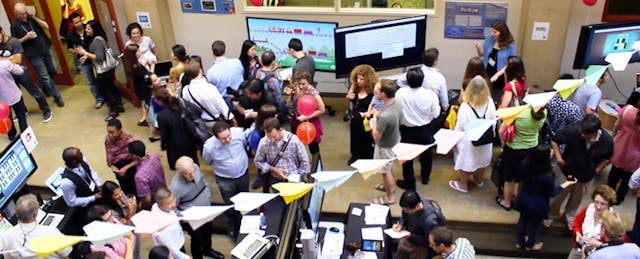Last Friday (August 3) was the annual Learning, Design and Technology Expo where many enthusiastic Masters students in the Stanford University School of Education LDT program presented their final projects--the culmination of a year-long dive into the multi-faceted field of edtech.
It's difficult to put the significance of these projects into perspective. Having gone through the LDT program two years ago, I can attest to the breakneck pace at which it moves. The year begins with immersion in over a century's worth of educational theory and an introduction to the renowned d.school design process. From here, everyone's experiences tend to diverge as students take a variety of related electives and participate in part-time internships. By the time the Spring Quarter rolls around, everyone is juggling many different teacups filled to the brim with water from many different fire hoses. Then after a quarter spent planning, pitching, and getting approval for a final project, the intrepid LDTers are left with approximately a month and a half to put together the projects and presentations on display at the annual expo. With this in mind, my honest (and not unbiased) opinion of the projects shown at this year's expo is that many of them seemed rushed, incomplete, and half-baked. Harsh? Perhaps, but let me explain myself.
At the post-Expo reception on the rooftop of CERAS, I struck up a conversation with a d.school teacher to whom I posed this question: the design process is fantastic, perhaps ideal, for finding optimal solutions to known problems given time and resource constraints, but what can design thinking do for education when we have not even conclusively figured out what the problems are? How can we possibly empathize with students and teachers when each individual varies so much in aptitude, motivation, and socio-economic status? How can we iterate when our testing cycle is 18+ years long?
Let me take a paragraph to emphasize this further: education is a monumentally complex topic. Say, for instance, there is a study proving that 4th grade students following a Constructivist math curriculum score 50% higher on state standardized testing. Great! From this, you might think it would be a good idea to institute Constructivist methodology in 4th grade math classes statewide. But let's delve a little deeper. Constructivism is a methodology that relies on reflective observations of the world, and is thus highly reliant on the student's environment--something that cannot be easily regulated or standardized. It also requires specially trained teachers to guide each student which means higher teacher salaries (i.e. higher taxes). We would also need a ton of qualified professors to train these teachers, which simply do not exist in large numbers outside of places like Stanford University (the seminal Constructivist literature of Jean Piaget is dry even by the standards of academia). And to top it all off, we won't know if the Constructivist curriculum was actually effective until many years later--perhaps students gained a conceptual understanding of the relevant math, but never developed the speed and arithmetic fluency that a more Behaviorist methodology might have afforded.
So back to the question: What can design thinking do for something as complex as education? The answer my d.school comrade gave is that the design process is never complete and requires always revisiting old ideas to see where they can be improved. I must admit that while it seems obvious now, this was a bit of a revelation to me up on that rooftop. The blisteringly fast-paced LDT program taught me how to develop robust solutions to unique problems, but its broad nature required that we constantly be moving onto new topics. With that in mind, products like programmable light-up sneakers are probably not going to single-handedly close the achievement gap (although I'd still like a pair for myself), even with superpowered shoelaces (ditto), but as long as students are coming up with fun solutions to meaningful learning problems, we are well on our way.
The students of the 2012 LDT class will be graduating in a couple of weeks and some will never touch their projects again, leaving them forever in a half-baked, incomplete state, and there's nothing wrong with that. However, a select few might choose to keep iterating and improving upon their fledgling ideas and eventually craft them into something much greater for the benefit of society. Regardless of the future, these Masters students are all well aware that their soon-to-come advanced degrees are not an indication that they have completed their education. Much to the contrary, these diplomas and projects merely signify the first step on a journey of lifelong learning.


